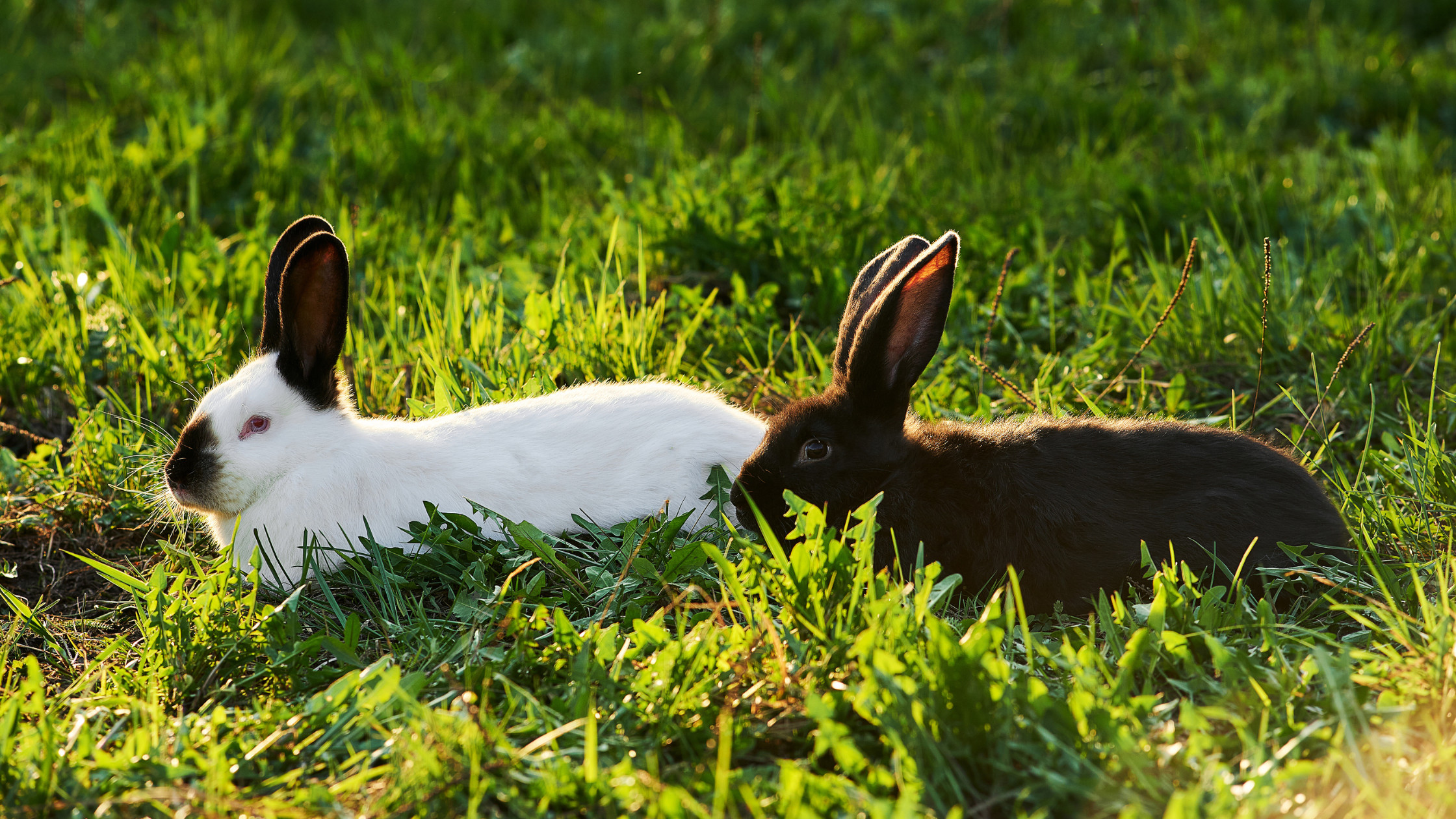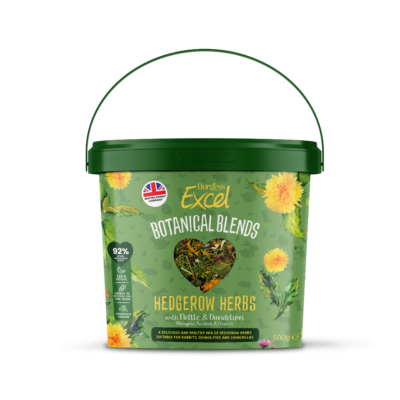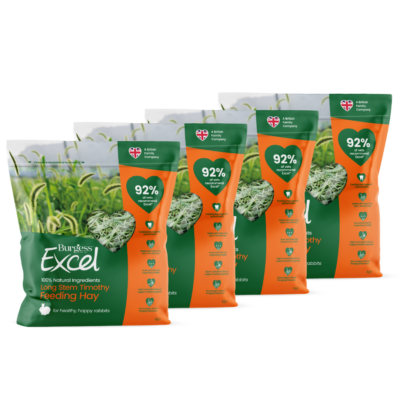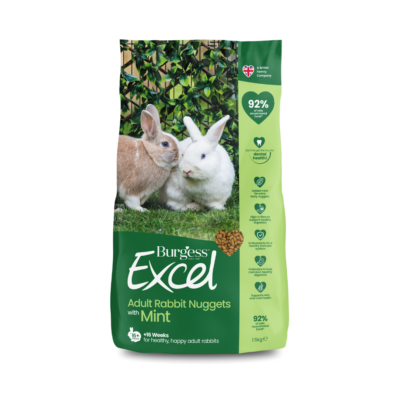
Every rabbit deserves to live a happy, healthy life – and what you feed them plays a big part in helping them enjoy their bounciest bunny days. A good place to start is thinking about what rabbits eat naturally in the wild, how they eat – and the effect the food they munch on has on their overall health.
In brief:
- Rabbits are herbivores (plant eaters) that need a high fibre diet, so high quality feeding hay should make up the bulk of their feeding plan.
- A handful of rabbit-friendly greens, herbs and vegetables provide variety and essential vitamins.
- A small portion of grass-based rabbit nuggets that contain vitamins and minerals will support immune system health, bone and dental health, and a healthy skin and coat.
- Rabbits need to keep their digestive system moving at all times or they will be at risk of gut stasis – a serious condition where their digestive system slows down or stops, causing severe pain. If left untreated, it can be fatal.
- Rabbits have continuously growing teeth that are designed to wear down naturally through chewing, especially on fibrous foods such as hay and grass.
Read on to find out more about the ideal bunny diet, what rabbits eat naturally, why hay is so important to their overall health, why rabbits need rabbit nuggets, suitable fresh food and treat options – and what foods you should never feed your rabbits.
What’s the ideal rabbit diet?
The right ingredients in the right balance will provide your buns with everything they need to be healthy and happy.
- FEEDING HAY A bunny-sized bundle of tasty, fibre-rich feeding hay per rabbit should be fed every day. This should make up around 85-90% of their daily diet.
- FRESH GREENS A handful of suitable fresh greens such as dandelion leaves, cauliflower leaves, carrot tops, celery leaves, green pepper, kale, asparagus, mint, romaine lettuce and spring greens should be fed twice daily.
- RABBIT NUGGETS A tablespoon of rabbit nuggets per rabbit should be given once a day (or twice a day if your rabbits are over 3.5kg).
- HEALTHY TREATS Some healthy, naturally nutritious treats can be fed daily to provide enrichment, help prevent boredom and encourage bonding and interaction.
- FRUIT AND VEG Occasionally in small amounts, you can treat your buns to apple (remove any pips as these are poisonous to rabbits), banana, savoy cabbage, turnip, carrot, swede, spinach, parsley, basil, dill, oregano and coriander.
- FRESH WATER Rabbits need a constant supply of fresh water, changed daily, provided in ceramic bowls that can’t be knocked over, as lapping is the most natural way for rabbits to drink.
TOP TIP! Veterinary charity PDSA recommends: “If you want to make a change to your rabbits’ diet, it’s important to do so slowly over a period of 2 – 4 weeks so not to upset their stomach or stop them from eating. Start by mixing a small amount of new food with current food – gradually increase the amount of new food and reduce the amount of old food each day, until they have fully transitioned. Fresh foods should also be introduced in this way. If you are introducing hay for the first time it might take them some time to start eating it but keep persevering – it’s worth it for your rabbits’ long-term health. Offer a fresh bundle every day and try different types to tempt them.”
Ever wished you could speak rabbit? Find out more about what rabbits really, really want!!! >>
What do wild rabbits eat?
Wild rabbits roam meadows, woods and forests, grazing on grasses found in their natural habitat, which provide them with essential fibre and nutrients. They’ll also feed on a wide range of herbs and weeds including dandelions, plantain, clover and chickweed, which offer additional nutrients and variety to their diet.
To keep pet rabbits healthy, it’s vital to try and replicate the high-fibre diet that their wild cousins eat naturally.
“It’s important to find rabbit food that will give your pets the right levels of fibre, vitamins and minerals needed for a healthy, balanced diet,” advises insurer Petplan. The Excel Feeding Plan from Burgess Pet Care is the UK’s number one vet-recommended range of food for rabbits and is based on all the natural foods your rabbits would eat in the wild.”
Pet supplies company Viovet adds: “Small animals, often referred to as fibrevores, have a complex digestive system which requires two types of fibre; digestible and indigestible, and to help owners incorporate this fibre into their pet’s daily diet Burgess Pet Care created the Burgess Excel Five Step Feeding Plan. It’s the UK’s number one vet recommended food for fibrevores and provides them with the perfect daily balance of fibre and nutrients.”
Why is hay so important for rabbits?
Hay is the number one bunny essential and provides these small pets with a whole host of benefits.
DIGESTIVE HEALTH Rabbits need to keep their digestive systems busy with a mix of two kinds of fibre – digestible fibre and indigestible fibre – moving through the gut at all times. They get this fibre mainly from good quality feeding hay. These small pets perform a digestive process that might seem rather odd to us humans, but for rabbits, it’s all perfectly natural. Called caecotrophy, it’s the way that small furries extract as much goodness as possible from their food. Simply put, they eat their droppings (caecotrophs), allowing many important nutrients to be reingested.
Here's how the process works:
- Indigestible fibre is moved through their digestive system and excreted as separate, rounded, hard droppings. This type of fibre keeps the digestive system moving and their appetite stimulated.
- Digestible fibre is moved up into an organ called the caecum – which is like a giant appendix. Good bacteria in the caecum ferment the fibre, making it easy to digest. This emerges in the form of clumps of sticky droppings, known as caecotrophs. Then, rabbits re-eat the caecotrophs directly from their bottom. This enables essential nutrients to be absorbed when the digestible fibre passes through for the second time.
DENTAL HEALTH Fibrous foods wear down teeth reducing the risk of dental problems. Burgess in-house vet, Dr Suzanne Moyes, says: “Premium quality feeding hay is especially good for dental health as the grinding action required to eat it helps to wear down teeth.”
BEHAVIOURAL HEALTH In the wild rabbits spend 70% of their time foraging. A constant supply of feeding hay and grazed fresh grass is essential to allow them to express this normal behaviour and help prevent behavioural problems. “Some rabbits can be quite fussy about the variety of feeding hay they like,” adds Dr Moyes. “Choose good quality feeding hay which has been grown specifically for this purpose, rather than bedding hay. Good quality feeding hay will be distinct by its fresh, fragrant green strands that aren’t dusty.”
What’s the difference between bedding hay and feeding hay? >>
Why do rabbits need rabbit nuggets?
“Although rabbit pellets only make up 5% of your rabbits’ diet, they play a vital role in making sure your bunnies get all the vitamins and minerals they need to support their overall health,” says Dr Suzanne Moyes.
“At Burgess, all our small pet nuggets are made from natural ingredients that are combined, thoroughly cooked to ensure any harmful bacteria, such as salmonella, and viruses are destroyed, and then thermally extruded into pellets. The specialised cooking process also ensures that these tasty little bullets of nutrition are easy for small animals to digest. Each ingredient – ranging from grass meal and wholegrain wheat to beneficial dried herbs such as mint and oregano, along with dried nettles and dandelions – make up a typical forage-based diet that small animals would find in their natural environment.”
Good quality rabbit pellets are:
- High in beneficial fibre to keep their digestive system working correctly
- Contain vitamin A and vitamin C to support the immune system
- Contain vitamin D3, which has an important role in calcium absorption, vital to support bone and dental health
- Contain vitamin E, which has an antioxidant function that aids the body’s natural defences
- Formulated with minerals such as zinc for healthy skin and coat, iron to support the blood, and copper for nerve function
- Made with tasty, natural ingredients, such as mint or oregano, to ensure your bunnies absolutely love their yummy nuggets!
Steer clear of brightly coloured muesli mixes – they may look more interesting to us humans but are not a healthy choice for rabbits. With rabbit nuggets, each mouthful is the same, which helps ensure your buns eat a balanced diet.
How to choose which rabbit nuggets are best for your buns >>
Do rabbits need fresh food?
Fresh greens contain valuable vitamins and minerals but are low in fibre, which rabbits need lots of, so don’t give your buns an unlimited supply or it will upset their digestion. A handful of rabbit-safe greens such as dandelion leaves, cauliflower leaves, celery leaves or kale a couple of times a day will keep mealtimes interesting without causing problems.
“Rabbits can be fed fresh greens to give additional nutrients and to provide some variety,” advises Dr Suzanne Moyes. “However, you need to be careful about what you feed them, and how much. Some fruits, such as a little bit of apple or banana can be fed, and are a great source of extra nutrients, but only feed in small amounts as they can be high in sugar.”
Can rabbits have treats?
Yes – as long as they are healthy! Avoid milk-based yoghurt drops or sticks of sweetened cereals as these can contribute to obesity and tooth decay.
“Treats and snacks can promote emotional health, help prevent boredom and encourage bonding and interaction between you and your pets,” says Dr Suzanne Moyes. “However, always opt for nutritious snacks that are packed with beneficial fibre, made with natural ingredients and contain no artificial colours or flavours.”
A munch on fibre-filled bunny treats also helps keep your buns’ teeth in good shape and maintain a healthy digestion. Burgess Excel’s innovative range of Nature Snacks includes:
- BAKED TREATS Baked with love, our Excel Baked Treats have no added sugar, artificial colours or flavours and support dental, digestive and behavioural health. Our Fruity Feasts baked treats contain banana and blueberry, our Herby Hearts contain mixed herbs and apple, and our Meadow Munchies are made from a tasty blend of dried meadow grasses and flowers that small furries love. Or why not try limited editionSunshine Snacks, made with a seasonal forage blend of blueberry and spinach that’s irresistible to rabbits!
- FORAGE FEAST BARS High in fibre and perfect for hand feeding, these tasty hay treats are made with natural ingredients and topped with delicious flowers. Choose from Cornflower, Marigold or Rose.
- FORAGE & FEAST MINI BALES Bite-sized bundles of hay topped with a choice of flavoursome flowers – Cornflower, Rosehip or Marigold.
- HERB MIXES Lovingly made, our delicious forage mixes are a healthy treat and are ideal for sprinkling on hay to encourage natural foraging behaviour. Luscious Leaves is made with a chompable mix of dandelion leaves, nettle leaves, red clover and ribwort and our Wildflower Forage is crafted with a tempting mix of rose, hibiscus, marigold and cornflower. And don’t miss out on our BRAND NEW Botanical Blends – a big bucket of hedgerow herbs including nettle leaf, dandelion leaf, marigold flower, burdock root and cleavers – ideal for sprinkling on hay to encourage natural foraging behaviour.
What’s the best way to feed rabbits?
Wild rabbits spend much of their day foraging for food and this natural bunny behaviour is something you want to encourage as it keeps our beloved pet buns busy and happy.
Rabbit Welfare, an organisation that works to ensure all pet rabbits in the UK are cared for with understanding, insight and kindness, says: “Rabbits that are fed in the right environment will spend more time foraging. Ideally, rabbits would graze on a lawn with lots of different plant species in it. This means that the rabbits have to move around a lot to find the food they need. However, this often isn’t available. You can also spread hay or grass around the rabbits’ enclosure or tuck it in multiple boxes or tubes – this stimulates the rabbit to explore different areas. Rabbits that can show normal foraging behaviours are more likely to be happy and healthy. They are also interesting to watch – how quickly can your rabbit search for and find his favourite foods?”
Add to the foraging fun by mixing some Botanical Blends, Luscious Leaves or Wildflower Forage in with your buns’ favourite hay.
What foods should I never feed my rabbits?
If in doubt, the best advice is not to feed something you’re not sure about to your rabbits. Here are some common foods that you should never give to rabbits:
- Light-coloured lettuce varieties are high in water and have very little nutritional value and will probably just give your rabbits the runs. Iceberg lettuce contains lactucarium, which can be harmful to rabbits in large quantities.
- Certain fruits including avocado as it’s too fatty for buns, rhubarb (leaves and stalks), and tomato leaves.
- Certain vegetables including potatoes and potato tops, garlic, onion, shallots, chives and chard – it’s a leafy green but not one that rabbits can tolerate, causing colic and bloating.
- Any plant that grows from a bulb and many wild plants including bluebells, yew, foxglove, hemlock, buttercup, dock, ivy, poppy, privet, primrose and ragwort.
- Grass cuttings Grazing on grass is a natural bunny activity but giving them a pile of grass cuttings will make them ill. The cutting process causes the grass to quickly start fermenting, which can lead to unpleasant digestive issues such as bloating.
- Bread, pasta and crackers High-carb foods like these can cause series stomach issues including enterotoxaemia – a toxic overgrowth of bad bacteria in the intestinal tract
- Nuts All nuts are high in fat not fibre and will give your rabbits extremely uncomfortable indigestion
- Rabbit muesli This encourages selective feeding when rabbits choose some components of the muesli diet in preference to others, resulting in an unbalanced diet. This has been scientifically proven by the University of Edinburgh to lead to all manner of health issues including dental disease, gut stasis and digestive problems, urinary tract problems and obesity.
CARE MORE From feeding to housing, companionship, health and behaviour, find lots of useful advice on caring for your rabbits from Burgess, the pet experts >>
TOP TIP! Traditionally thought of as good pets for children, rabbits are not easy to look after correctly. Small animals are often more complex to feed and care for than a cat or dog and require more looking after than a child can offer. So, while it’s lovely for children to enjoy the company of rabbits, the responsibility for any animal’s wellbeing lies with adults, who must always be responsible for overseeing their care.
NUTRITIOUS FOOD FOR HEALTHY, HAPPY RABBITS – 92% OF UK VETS RECOMMEND OUR BURGESS EXCEL SMALL PETS RANGE!
Along with our outstanding feeding hay range, check out our tasty nugget varieties specially created for junior and dwarf rabbits, indoor bunnies, golden oldies and adult rabbits – there’s even a light recipe for buns who are watching their weight! And don’t forget our delicious range of healthy treats!
LET’S GET SOCIAL! Sign up to the Excel Bunny Base – a safe Facebook community for rabbit guardians that are looking for advice and friendly discussions from likeminded owners – and there are lots of cute bunny photos and videos! Also join us on Instagram.
If you found this interesting, you may also like:
HOW TO CREATE A HAPPY, HOPPY HOME FOR YOUR RABBITS Your rabbits’ living space has a big impact on how healthy and happy they are. That’s why creating the best rabbit residence you can is so important. Our top tips show you how.
HOW MUCH SPACE DO YOUR RABBITS NEED? If you have a couple, a throuple or even a band of well-bonded bunnies, you’ll know just how much they love hanging out together. However, even the best bunny pals need their own space.
WHY GOOD HOUSEKEEPING IS A SMALL PET ESSENTIAL Keeping your small pets’ home clean and dry is super important. Dirty, damp bedding not only creates an unhealthy environment for small furries, but it will also become a magnet for all manner of pests.
HOW TO HELP YOUR BUNNIES GET ALL THE EXERCISE THEY NEED To encourage your bunny chums to like to move it, move it, create an exciting space where they can hop, run, jump, explore and forage.
DO YOUR SMALL PETS HAVE THE RIGHT TO ROAM? Find out why giving small furries the chance to scamper about in a safe, enriching space is essential to their health and wellbeing.
21 AMAZING RABBIT FACTS FOR BUNNY FANATICS Even if you’re a lifelong bunny lover, there are a few things you may not know about your hay-chomping chums.
SMALL FURRIES NEED A SECOND CHANCE TOO As well as taking on a rescue dog or adopting a cat from an animal sanctuary, did you know that there are lots of small furries in rescue centres around the country that are looking for loving homes?
WHAT PUTS YOUR SMALL PETS IN A GOOD MOOD? Along with socialising with their same species companion and interacting with their favourite human, our survey reveals the best thing you can to do to give your small furries a happiness boost…
LITTER TRAINING YOUR RABBITS Whether your buns live indoors or out, litter training has lots of benefits – both for them and you!
HOW DO YOU GROOM RABBITS? Keeping clean and neat is very important to rabbits and, just like cats, buns spend a huge amount of time grooming themselves. They also need a little help from us.
WHICH POPULAR RABBIT BREEDS HAVE THE MOST HEALTH ISSUES? ‘Cute’ bunny breeds such as the Lionhead rabbit, the Netherland Dwarf rabbit and the Mini Lop, are at risk from long-term health problems.
INDOOR GUINEA PIGS AND HOUSE BUNNIES Once traditionally always housed outdoors, many people enjoy keeping their guinea pigs or rabbits as indoor pets – and there are all sorts of reasons why.
BONDING WITH YOUR BUNNY CHUMS Whether your buns are already part of the family, or you’ve just welcomed some new rabbits into your family, find out how to deepen your connection with your nose-twitching pals.
RABBITS AND GUINEA PIGS – IS INDOORS OR OUTDOORS BEST? Is the outdoor life better for bunnies and guinea pigs, or will these small pets have a more enriching time if they’re kept indoors?
GAMES TO PLAY WITH YOUR RABBITS Bunnies are smart and active creatures who like lots of things to do and games to play – particularly if there are some tasty rabbit treats involved. We’ve some fun ideas to add interest and excitement to your buns’ day.
BUNNY TALK Rabbits have a complex language all of their own. By learning to understand their body postures, behaviours and vocalisations, you’ll uncover their individual personalities.
HOW TO BE A GOLD-STAR INDOOR BUNNY OWNER Indoor rabbits make fabulous house pets, as long as you provide these smart and sociable animals with everything they need.
FINDING A VET FOR YOUR SMALL PETS Did you know that just like hospital specialists, vets have different areas of expertise? That’s why, if you have small pets, it can be a good idea to seek out a vet that specialises in small animal medicine.
PET INSURANCE EXPLAINED Can you get pet insurance for pre-existing conditions? Can you get pet insurance for older pets? Can you get multi-pet cover? We answer some of the most commonly asked questions to help you make an informed decision.

















